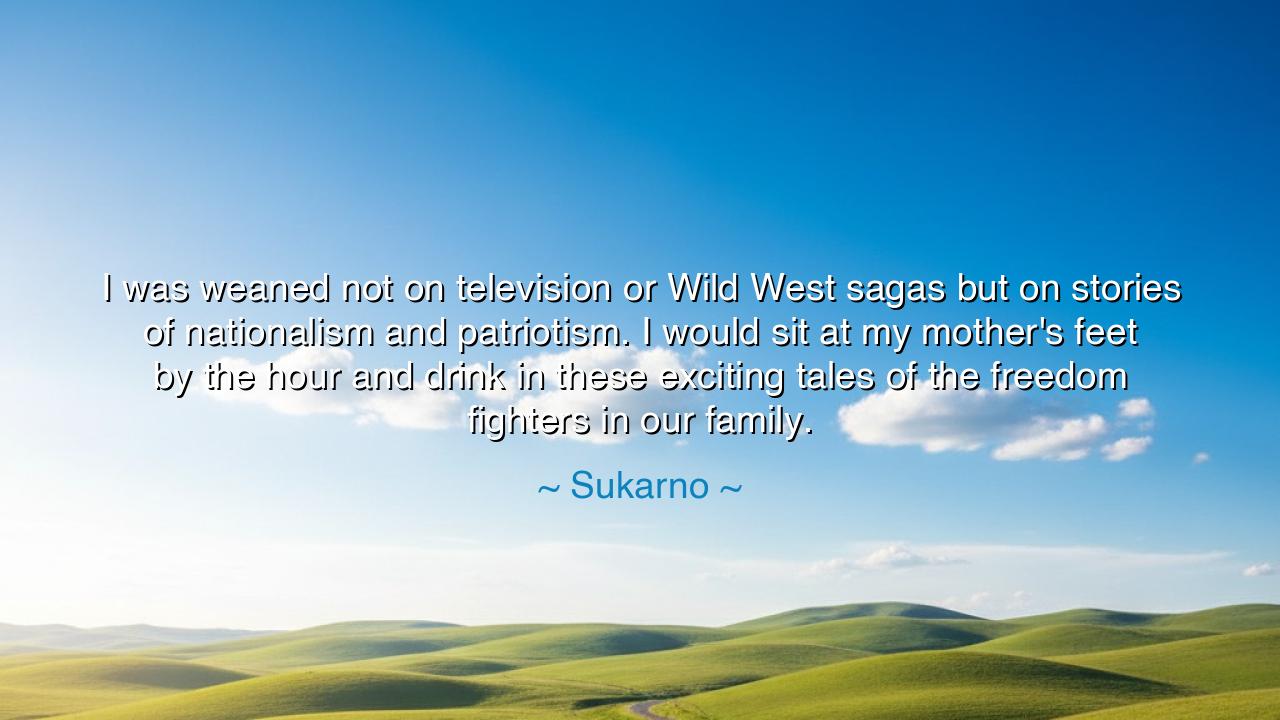
I was weaned not on television or Wild West sagas but on stories
I was weaned not on television or Wild West sagas but on stories of nationalism and patriotism. I would sit at my mother's feet by the hour and drink in these exciting tales of the freedom fighters in our family.






The revolutionary leader and statesman Sukarno once reflected: “I was weaned not on television or Wild West sagas but on stories of nationalism and patriotism. I would sit at my mother's feet by the hour and drink in these exciting tales of the freedom fighters in our family.” In these words lies a profound meditation on the origin of patriotism—not as a learned obligation imposed by society, but as an inherited flame, nurtured by story, memory, and the lived example of one’s forebears. Sukarno reminds us that love of country is often born in the hearth of the family, in the quiet transmission of courage and commitment across generations.
In the wisdom of the ancients, virtue was not merely taught; it was illustrated through narrative and example. Socrates, Aristotle, and the Roman moralists all emphasized the formative power of stories, the way that tales of heroism, justice, and sacrifice shaped the character of youth. Sukarno’s reflection resonates with this timeless principle: patriotism is not a superficial sentiment but a moral inheritance, absorbed by witnessing the courage and devotion of those who came before.
History offers vivid instances of this familial cultivation of patriotism. Consider the sons and daughters of the American Revolution, who grew up on tales of their ancestors’ courage at Lexington and Concord, or their service in the Continental Army. These stories instilled a sense of duty, bravery, and love of country, long before civic institutions could formalize allegiance. Sukarno’s childhood, steeped in stories of freedom fighters within his own family, mirrors this formative experience: patriotism is born in the imagination, fueled by the valor and sacrifice of forebears.
Sukarno’s reflection also emphasizes the emotional and heroic dimension of patriotism. Unlike passive allegiance or abstract ideology, the love of country he describes is animated by excitement, admiration, and inspiration. Tales of family members who fought for freedom were not dry accounts of events; they were living examples that stirred the heart, imbuing him with courage, purpose, and a sense of moral responsibility. Patriotism, in this view, is not inherited as duty alone but as a burning, personal engagement with the struggle for justice.
Consider the story of Mahatma Gandhi, who grew up hearing accounts of Indian resistance to colonial oppression. These narratives, told in the intimate circle of family and community, inspired him to a lifelong commitment to justice, nonviolence, and national service. Like Sukarno, Gandhi’s patriotism was born not from textbooks or ceremonies but from stories that illuminated the moral stakes of allegiance and the sacrifices demanded by devotion to the nation.
The deeper meaning of Sukarno’s words is that patriotism is inseparable from memory, culture, and the personal transmission of values. It is not merely a legal or ceremonial obligation; it is a moral inheritance, passed down through the stories, deeds, and sacrifices of those who loved and defended the land before us. True nationalism and patriotism are forged in the imagination and nurtured in the moral education of the young, who absorb courage and responsibility alongside admiration for those who came before.
From this teaching emerges a timeless lesson: patriotism is cultivated in the heart and mind long before it is formalized in law or ritual. It requires exposure to virtue, sacrifice, and moral courage, often through stories that inspire and illuminate. One cannot demand patriotism by decree; it grows in the soil of memory, example, and familial or communal devotion.
Practically, this calls citizens and families to transmit the values of courage, justice, and devotion through stories, example, and mentorship. Share the histories of struggle, heroism, and sacrifice with younger generations. Celebrate those who acted for the common good, and illustrate the moral dimensions of national service. In doing so, one honors Sukarno’s vision: patriotism is a living inheritance, absorbed through narrative, example, and the moral imagination, preparing each generation to uphold the freedom and dignity of their nation.






AAdministratorAdministrator
Welcome, honored guests. Please leave a comment, we will respond soon